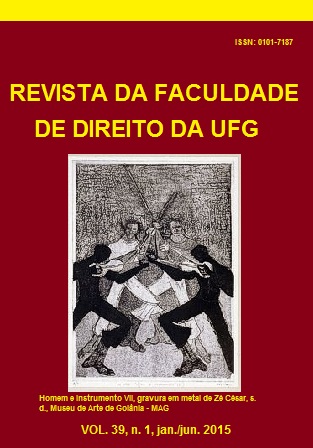LICITAÇÕES SUSTENTÁVEIS: DA INADEQUAÇÃO DA LEI 8.666/93 ÀS INOVAÇÕES APRESENTADAS PELO REGIME DIFERENCIADO DE CONTRATAÇÕES PÚBLICAS E PELO PROJETO DE LEI 559/2013 DO SENADO - DOI: http://dx.doi.org/10.5216/rfd.v39i1.34629
DOI:
https://doi.org/10.5216/rfd.v39i1.34629Keywords:
Licitação. Sustentabilidade. Requisitos ambientais. Meio ambiente.Abstract
RESUMO:
Este estudo trata da implementação das licitações sustentáveis no âmbito da Administração Pública. O objetivo é verificar se, à luz dos dispositivos constitucionais e infraconstitucionais vigentes, há respaldo legal para o estabelecimento de critérios e requisitos ambientais nas licitações. Visando atingir o objetivo proposto, faz-se uma análise do tratamento que a Constituição da República de 1988 dispensa ao meio ambiente. Em seguida, promove-se o estudo da Lei 8.666/93, com a finalidade de verificar se seus dispositivos autorizam a Administração Pública a estabelecer critérios e requisitos ambientais nas licitações. Neste ponto, enfatiza-se a amplitude do princípio da legalidade e as limitações que ele impõe ao administrador. São abordadas também, neste trabalho, as inovações trazidas pela Lei 12.462/2011, que instituiu o regime diferenciado de contratações públicas, estabelecendo de forma clara a possibilidade de exigir-se, nas licitações, o cumprimento de requisitos ambientais pelas sociedades empresárias que desejarem contratar com a Administração Pública, paradigma a ser seguido pelo legislador pátrio para a implementação das licitações sustentáveis no Brasil. Por fim, busca-se analisar dispositivos do Projeto de Lei 559/2013 do Senado, que tramita no Congresso Nacional e que objetiva instituir uma nova lei geral de licitações e contratações públicas, verificando se a abordagem oferecida à sustentabilidade nas compras públicas é adequada para que o Poder Público possa, legitimamente, condicionar suas contratações ao atendimento de requisitos ambientais pelos potenciais fornecedores e prestadores de serviços.
ABSTRACT:
This study deals with the implementation of sustainable bidding under the Government. The goal is to determine whether, pursuant to constitutional and infra existing provisions, there is legal support for the establishment of criteria and environmental requirements in bidding. Aiming to achieve this purpose, it was made an analysis of the treatment that the Constitution of 1988 gives to the environment. Then promotes the study of Law No. 8,666/93, in order to verify that their provisions allow the Government to establish environmental criteria and requirements in bidding. At this point, we emphasize the amplitude of the principle of legality and the limitations it imposes on the administrator. In this work are also addressed the innovations introduced by Law No. 12,462/2011, which established the differential charging system for government procurement, establishing clearly the possibility of requiring, under the bidding, compliance with environmental requirements by business companies wishing to hire along with the Government, paradigm to be followed by parental legislator for the implementation of sustainable bidding in Brazil. Finally, we try to analyze the provisions of the Senate Bill No. 559/2013, that are being maintained in the National Congress and aims to establish a new general law of bidding and government procurement, making sure that the approach offered to the sustainability in government procurement is suitable so that the Government can legitimately, condition their hiring to meet environmental requirements by potential suppliers and service providers.
Downloads
Downloads
Published
How to Cite
Issue
Section
License
Os Autores que publicam nesta revista concedem à Revista da Faculdade de Direito da UFG uma licença mundial, sem royalties, sujeita aos termos e condições da Licença Jurídica Creative Commons Atribuição 3.0 Brasil Creative Commons Attribution License
Os autores concedem à RFD UFG todos os direitos autorais sobre os artigos nela publicados, que os mantêm com exclusividade até o advento de domínio público sobre os mesmos.
























